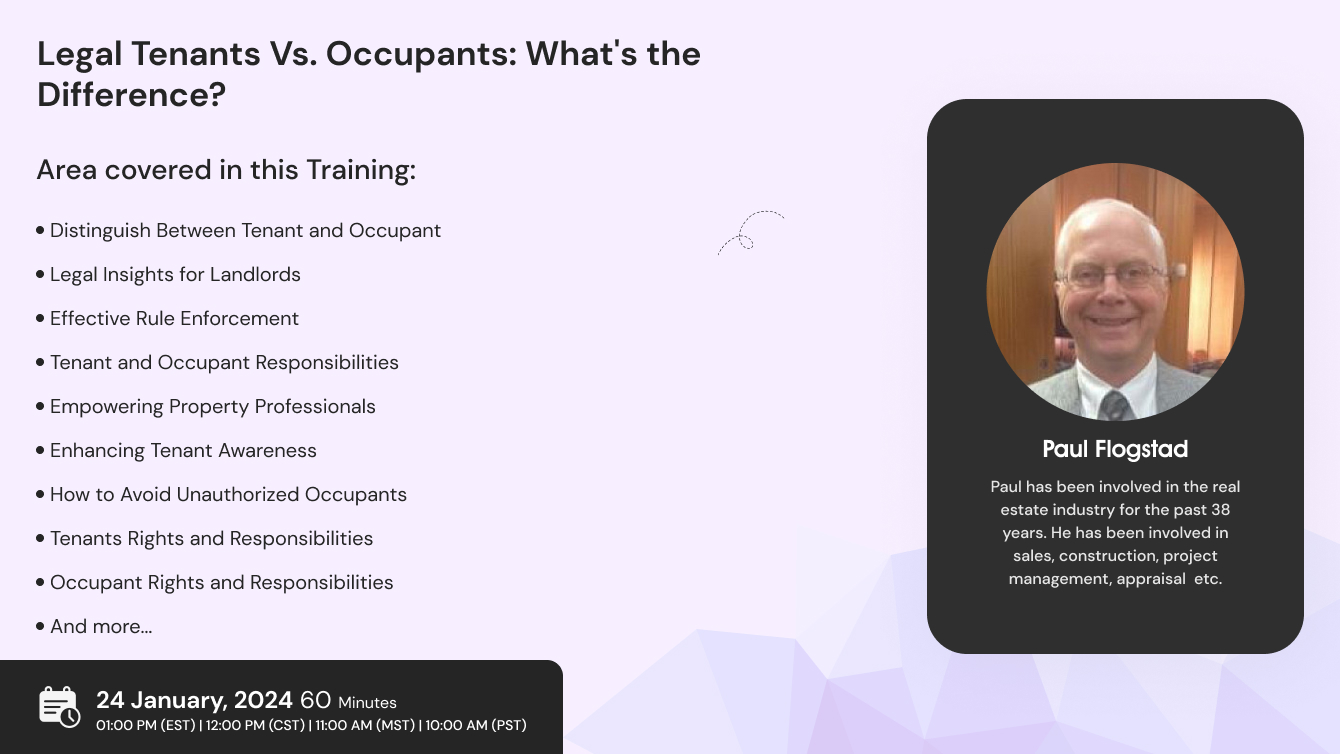Overview:
Many landlords use the terms “tenant” and “occupant” interchangeably, but each has a different implication from a rental standpoint. However, knowing the difference between a tenant and an occupant is important. Knowing the definitions of each can help rental owners and managers understand their legal rights and obligations while dealing with tenants and occupants. For instance, tenants sign a legally binding contract with the landlord and are responsible for paying rent and following lease terms. However, an occupant is simply authorized to live in a rental with the landlord’s permission. As such, they sometimes have different responsibilities or protections than tenants.
For property owners and managers, grasping these disparities is pivotal for effective rule enforcement and agreement adherence. Likewise, tenants and occupants will gain clarity on their respective obligations within a rental home.
In this webinar, as we unravel the intricate dynamics, we'll emphasize the crucial role of a meticulous property management team armed with a robust screening process. Discover the keys to securing responsible tenants who will cherish and maintain your property throughout the entire tenancy. This Webinar will also explore tenant rights and responsibilities as well as Occupant rights and responsibilities.
Areas Covered in this Training:
· Distinguish Between Tenant and Occupant: Understand the legal disparities in rights and responsibilities.
· Legal Insights for Landlords: Navigate leasing agreements and legal implications for tenants and occupants.
· Effective Rule Enforcement: Develop strategies tailored to tenants and occupants for harmonious living.
· Tenant and Occupant Responsibilities: Clarify distinct roles and obligations within a rental property.
· Empowering Property Professionals: Emphasize the importance of a robust property management team and screening process.
· Enhancing Tenant Awareness: Empower residents with knowledge about their roles, rights, and obligations.
Why Attend this Training:
The terms “tenant” and “occupant” describe individuals living in a rental property. But what’s the difference, and how does it affect your business.
We will go into detail as to who is a tenant who is an occupant. We will talk about unauthorized and authorized occupants. Also covered will be how to avoid unauthorized occupants. We will cover and debunk six common myths of tenants versus occupants.
Special topics include:
· Is A Family Member Considered a Tenant?
· Who Is Served Can a Leaseholder Kick an Occupant Out?
· The Notice of Moving Out?
· Is The Occupier the Tenant?
· Where Does the Security Deposit Go?
· How Does a Tenant’s Death or Abandonment Affect the Occupant?
Suggested Attendees:
· Property Managers
· Property owners
· Leasing Consultants
· Housing Authority Staff
· Compliance staff
· Developers

Paul Flogstad
Paul has been involved in the real estate industry for the past 38 years. He has been involved in sales, construction, project management, appraisal, property management, and property management consulting/training.
Through his consulting company, Property Management Solutions, he provides training and consulting services nationwide to owners, management companies, multi-housing associations, as well as state and federal agencies.
He specializes in fair housing issues and has developed fair housing and outreach programs for governmental agencies as well as conducting seminars which are presented to property management companies, apartment associations, and the general public nationwide. Most recently, he has been a consultant to the State of South DakotaSept
For over twenty years he was involved in the appraisal of residential, multi-family, farm, and commercial properties throughout the Midwest. Most recently, he was a consultant for affordable, multi-housing properties in 22 different states. This involved properties in HUD, Rural Development, HOME, and Tax Credit programs.

ACCREDITATIONS


